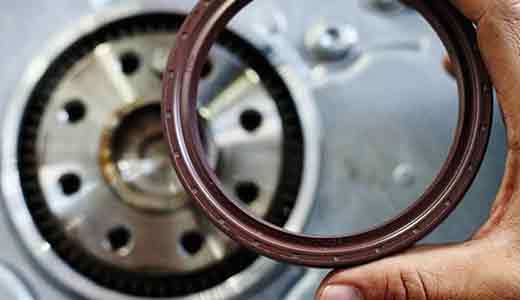Popular Information
Add: Yongkang st.renxian,xingtai city,hebei province china.054000
Tel:+86-319-7566977 7519805
Phone : +8613903298188
Fax:+86-319-7566976
E-mail :richard@bxseals.com
How to Choose the Right Fluorocarbon Oil Seal for Agricultural Applications
Release Time:
Nov 15,2025
How to Choose the Right Fluorocarbon Oil Seal for Agricultural Applications Agricultural machinery plays a crucial role in modern farming, and the efficiency of these machines can largely depend on the components used within them. One such critical component is the oil seal, particularly fluorocarbon oil seals, which are essential for ensuring the machinery operates smoothly and efficiently. In th
How to Choose the Right Fluorocarbon Oil Seal for Agricultural Applications
Agricultural machinery plays a crucial role in modern farming, and the efficiency of these machines can largely depend on the components used within them. One such critical component is the oil seal, particularly fluorocarbon oil seals, which are essential for ensuring the machinery operates smoothly and efficiently. In this comprehensive guide, we will delve into the intricacies of choosing the right fluorocarbon oil seal for agricultural applications, focusing on factors that affect performance, types, and best practices for maintenance.
Table of Contents
- Understanding Fluorocarbon Oil Seals
- The Importance of Oil Seals in Agriculture
- Key Factors in Choosing Fluorocarbon Oil Seals
- Types of Fluorocarbon Oil Seals
- Installation Process of Oil Seals
- Maintenance Tips for Fluorocarbon Oil Seals
- Common Mistakes to Avoid
- Conclusion
- FAQs
Understanding Fluorocarbon Oil Seals
Fluorocarbon oil seals are specialized seals made from fluoropolymer materials, designed to withstand extreme temperatures and aggressive chemicals. Their robust nature makes them suitable for various applications, particularly in agricultural machinery where exposure to oils, fuels, and other harsh substances is common. These seals are renowned for their excellent resistance to wear, sealing capabilities, and overall durability, making them a preferred choice in the agricultural sector.
Characteristics of Fluorocarbon Oil Seals
Fluorocarbon oil seals possess several key characteristics that enhance their performance:
- **Chemical Resistance**: They can withstand a wide range of chemicals, including agricultural oils and solvents.
- **Temperature Tolerance**: They perform well in both high and low-temperature environments, typically from -20°C to +200°C.
- **Low Friction**: Their low friction properties reduce wear on moving parts, improving the efficiency of machinery.
- **Durability**: High resistance to abrasion and deformation ensures a longer lifespan.
The Importance of Oil Seals in Agriculture
Oil seals are crucial for maintaining the integrity of agricultural machinery. They prevent the leakage of lubricants, which is essential for the smooth operation of equipment such as tractors, harvesters, and tillers. The right oil seal helps avoid costly repairs and machinery downtime, contributing to enhanced productivity.
Benefits of Using Fluorocarbon Oil Seals
Utilizing fluorocarbon oil seals in agricultural applications offers several benefits:
- **Enhanced Longevity**: Their durability translates to less frequent replacements.
- **Cost-Effectiveness**: Reducing the risk of leaks leads to lower maintenance costs.
- **Improved Performance**: They ensure that machinery operates at peak performance, reducing the risk of breakdowns during crucial farming periods.
Key Factors in Choosing Fluorocarbon Oil Seals
Selecting the right fluorocarbon oil seal requires careful consideration of various factors that can impact the seal's performance and longevity.
1. Operating Environment
The operational conditions of your agricultural machinery can significantly influence the type of seal you need. Consider factors such as temperature fluctuations, exposure to chemicals, and the presence of dirt or moisture. Fluorocarbon oil seals are particularly beneficial in harsh environments where other materials might fail.
2. Size and Compatibility
Ensure that the oil seal you choose is compatible with the specific equipment and its dimensions. An improperly sized seal can lead to leakage and equipment failure. Always refer to the manufacturer’s specifications or consult with a professional.
3. Type of Lubricants
Different lubricants can affect the performance of oil seals. Fluorocarbon seals are typically compatible with a broad range of oils. However, it’s essential to choose a seal designed for the specific type of lubricant used in your machinery.
4. Load Conditions
Assess the load conditions under which your machinery operates. Heavy-duty applications may require seals with enhanced strength and durability to withstand increased pressure and wear.
5. Seal Design
The design of the oil seal can influence its effectiveness. Consider factors like lip design, sealing lip material, and the presence of features such as dust lips that can further enhance sealing performance.
Types of Fluorocarbon Oil Seals
Understanding the various types of fluorocarbon oil seals can help in making an informed decision. Here are the most common types used in agricultural applications:
1. Single Lip Seals
Single lip seals are designed to prevent the leakage of lubricants from one side. They are suitable for applications where exposure to external contaminants is minimal.
2. Double Lip Seals
Double lip seals provide additional protection against contaminants and are ideal for harsher environments. The dual lip design offers improved sealing capabilities, making them perfect for agricultural machinery that operates in challenging conditions.
3. Spring-Loaded Seals
These seals feature a spring that maintains constant pressure against the shaft, providing superior sealing performance. They are particularly useful in applications with fluctuating pressures.
4. Special Profile Seals
Some applications may require specialized seal profiles for enhanced performance. Custom seals can be designed based on specific requirements such as unique shapes or sizes.
Installation Process of Oil Seals
Proper installation of fluorocarbon oil seals is critical to their performance. Here are the steps to ensure successful installation:
1. Preparation
Before installation, clean the sealing surfaces thoroughly to remove any debris or old seal material. This ensures a proper fit for the new seal.
2. Lubrication
Apply a small amount of lubricant to the sealing lip to facilitate easier installation and prevent damage during the process.
3. Alignment
Carefully align the seal with the housing and shaft to avoid misalignment, which can lead to premature failure.
4. Pressing the Seal
Use a seal driver or suitable tool to gently press the seal into place. Avoid using excessive force, as this can damage the seal.
5. Final Check
Once installed, visually inspect the seal to ensure it is seated correctly. Check for any signs of damage or misalignment before reassembling the machinery.
Maintenance Tips for Fluorocarbon Oil Seals
Maintaining your fluorocarbon oil seals is crucial for ensuring their longevity and performance. Here are some effective maintenance tips:
1. Regular Inspections
Conduct regular inspections of your machinery to check for any signs of oil leaks or seal wear. Early detection of issues can save you from costly repairs.
2. Keep Seals Clean
Ensure that the area around the seals is free from dirt, debris, and contaminants that can compromise their integrity. Use appropriate cleaning methods to avoid damaging the seals.
3. Monitor Operating Conditions
Be aware of the operating conditions of your machinery. Extreme temperatures, aggressive chemicals, or excessive pressure can impact the performance of your seals.
4. Replace Worn Seals Promptly
If you notice any signs of wear or leakage, replace the seals as soon as possible to avoid further damage to your machinery.
Common Mistakes to Avoid
Making informed decisions is crucial, and avoiding these common mistakes can help ensure the longevity and performance of your fluorocarbon oil seals:
1. Choosing the Wrong Size
Always verify the size and compatibility of the oil seal with your machinery. An improper fit can lead to leaks and equipment failure.
2. Ignoring Operating Conditions
Failing to consider the specific operating environment can lead to premature seal failure. Always select seals designed for your machinery's unique conditions.
3. Neglecting Maintenance
Regular maintenance is vital for the longevity of oil seals. Ignoring routine inspections can result in unexpected breakdowns and costly repairs.
4. Using Incompatible Lubricants
Ensure that the lubricants used in your machinery are compatible with the fluorocarbon seals to prevent degradation and failure.
Conclusion
Choosing the right fluorocarbon oil seal for agricultural applications is an essential task that demands careful consideration of various factors. By understanding the characteristics, benefits, and types of oil seals available, as well as adhering to best practices for installation and maintenance, you can significantly enhance the performance and longevity of your agricultural machinery. Investing time and resources into selecting the right seal will pay off in improved efficiency and reduced downtime, ultimately contributing to the success of your agricultural operations.
FAQs
1. What is the lifespan of fluorocarbon oil seals?
The lifespan of fluorocarbon oil seals can vary based on operating conditions, but they are designed to last several years under normal circumstances.
2. Can I use fluorocarbon oil seals in high-temperature environments?
Yes, fluorocarbon oil seals are well-suited for high-temperature applications, typically handling temperatures from -20°C to +200°C.
3. How do I know if my oil seal needs replacement?
Signs of oil leaks, visible wear, or deformation may indicate that your oil seal needs replacement.
4. Are there any specific lubricants recommended for use with fluorocarbon seals?
Fluorocarbon seals are generally compatible with a wide range of oils, but it's best to check with the manufacturer for specific recommendations.
5. Can I install oil seals myself, or should I hire a professional?
While it is possible to install oil seals yourself, proper tools and techniques are essential. If you're unsure, consider hiring a professional to ensure a correct installation.
Key words:



